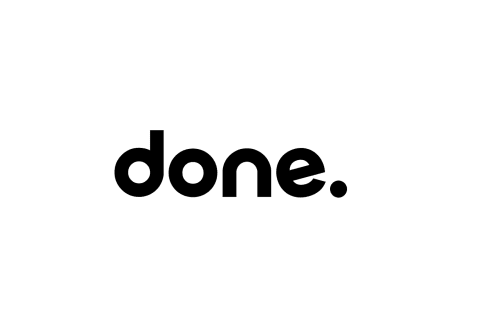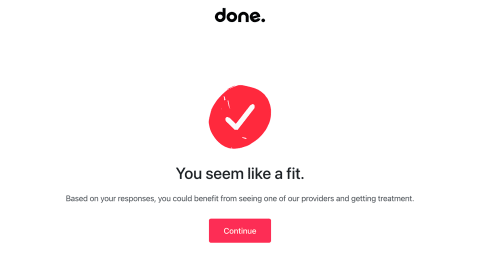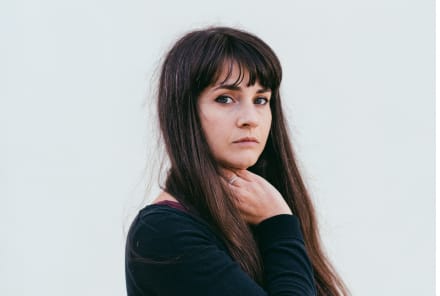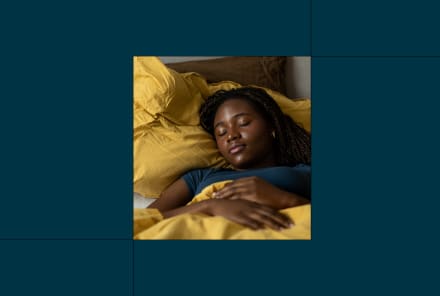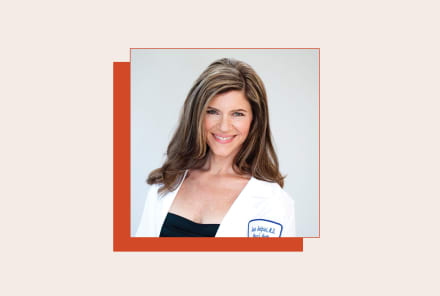Advertisement
I Have ADHD — Here's My Honest Review Of Done Online Services

Adult ADHD diagnoses in the U.S. have seen a massive increase in recent years, particularly when many jobs went remote. And, thanks to this growing demand for ADHD treatment (especially among women), there's a higher prevalence of shortages in both psychiatric care and medication—leaving many ADHDers without the support they deserve.
That's where Done. comes in, offering virtual psychiatric services for people with ADHD. As a woman who was diagnosed with ADHD at the age of 26, I tested Done. to see how the diagnosis and treatment process worked (and whether it's worth it).
Don't have time to scroll? Here's our cheat sheet:
- Done.'s services are completely virtual, which provides ease and convenience for folks like myself who struggle with executive function.
- Working with board-certified physicians who specialize in ADHD treatment helps patients find a prescription that works best for them.
- Done. doesn't take insurance for its services, but you can use your HSA/FSA benefits to cover appointments and membership fees.
- Done.'s physicians are extremely collaborative and provide hands-on support to ensure each patient is fully on board with their treatment plan.
- A Done. therapist or ADHD coach may be a better fit for a holistic approach. My provider actually recommended this course of action for me!
What is Done.?
Founded in 2019, Done. is an online clinic with the mission to make treatment for individuals with attention-deficit/hyperactivity disorder (ADHD) more accessible and convenient.
The clinic offers personalized care plans from licensed health care providers who have experience diagnosing and treating ADHD.
How does Done. work?
After administering an ADHD screening to see if you're a good fit for Done.'s services, you'll schedule a consultation with a health care provider, then fill out a pre-appointment assessment that covers behavioral questions and your medical history.
From there, the process looks like this:
The ADHD screening
The initial Done. health screening asks questions about various ADHD symptoms, such as:
- When you have a task that requires a lot of thought, how often do you delay getting started?
- How often do you have problems remembering appointments or obligations?
- How often do you fidget or squirm with your hands or feet when you have to sit down for a long time?
Based on my answers, Done. said I was a good fit for its ADHD treatment programs. Next, it was time for me to take my pre-appointment assessment.
The pre-appointment assessment
After I scheduled my appointment, I was asked to take a pre-appointment assessment. The assessment covered further behavioral questions and prompts such as:
- Before I was 12 years old, my teacher or coach noted my poor focus, impulsivity, and/or hyperactivity.
- How often do you misplace or have difficulty finding things at home or at work?
- My mental health status (today and in the past)
- A rundown of my current medications, any drug allergies, etc.
If you wait until the night before your consultation to complete your assessment (like I did), you'll receive a number of reminder emails and texts from Done. reminding you to answer the questions in order to provide your health care provider with a full rundown of your health history. I received one email and three texts prompting me to fill out my assessment, as well as an appointment reminder text one hour before my consultation—and, as someone who can procrastinate, I appreciated these reminders.
The virtual consultation
Finally, after completing your questionnaire, you're ready to meet with a Done. physician for your initial 25-minute appointment. Mine was with a psychiatric-mental health nurse practitioner (PMHNP).
After reviewing your pre-appointment assessment answers, your provider will ask additional clarifying questions about your symptoms and overall mental well-being.
Topics covered include:
- ADHD symptoms
- Other mental health symptoms (panic attacks, suicidal thoughts, etc.)
- Past hospitalization for mental health
- Family history of physical and mental health issues
- Other familial diagnoses of ADHD
- Non-medication practices and habits for managing your ADHD
- What your hobbies are
- If you have financial stressors
- History of trauma and/or abuse and if you feel safe and supported in your home
After we completed these questions, my physician gave her recommended treatment plan and we discussed what my care might look like. This part felt very collaborative, and she was happy to answer my questions and address any concerns to ensure I was truly on board with the treatment plan.
How much does Done. cost?
The initial 25-minute consultation costs $199, with a $20 deposit when you book. After your first appointment, Done. charges $79 per month for membership, which includes:
- 24/7 access to your provider
- Treatment adjustment
- Prescription refill services
- Follow-up appointments
Medication expenses are not included in the membership but can often be covered by insurance. If you have an FSA or HSA account, you can use them to pay for your membership and initial consultation—however, Done. does not take insurance for these costs.
Who should try Done.?
If you're the type of ADHDer who's looking for a streamlined psychiatric service to help you manage your medication, Done. might be for you. The hands-on approach makes patients feel supported, and the physicians seem very dedicated to developing personalized treatment plans that their patients are truly comfortable with.
Who shouldn't try Done.?
Personally, I've tried medication during a few phases of my life and have since determined that daily use doesn't support my long-term health goals. As a psychiatric service, Done.'s treatment plans do involve medication. If you also prefer a more holistic approach, Done. can offer some support but ultimately may direct you elsewhere.
Side note: I'm definitely not dissing taking ADHD meds because wow, my brain feels superhuman when I use them! (It's honestly mind-boggling to me that neurotypicals can focus with such ease.)
My experience using Done.
Ultimately, using medication over long periods of time feeds my workaholic tendencies and leads to burnout. I've discovered that medication is just not a sustainable treatment for me, so I lean into holistic habits and nutrition instead to support my easily distracted brain on a daily basis.
For this reason, Done. didn't turn out to be an ideal service for me. When my provider recommended I try a prescription, I explained that I'd like to avoid medications at all costs.
She was actually very supportive! She said that I'm already taking everything I can from a supplements standpoint (as mindbodygreen's former supplements editor, I know this isn't true, but I also didn't come to Done. for nutrition advice) and recommended I find a therapist—specifically one that does cognitive-behavioral therapy (CBT) because "talk therapy won't do it for [me]."
My physician referred me to the Psychology Today directory to find a therapist and recommended I check out CHADD for psychoeducation resources. Next, she suggested I cancel my Done. membership to avoid monthly fees since we wouldn't be needing follow-up appointments to address my treatment plan (hello, integrity!). She even stayed an extra 10 minutes past time to discuss my options.
I appreciated the guidance she provided and was impressed that she didn't try to convince me to stay when she realized Done.'s services weren't going to support my health needs.
ADHD treatment options
Each individual with ADHD is unique and will likely require a combination of approaches, whether that means sticking to a consistent exercise and nutrition plan or utilizing both medication and holistic habits to keep symptoms at bay.
"It is important to say that people should not feel like they have to choose one—prescription medications or holistic health treatments," says Romie Mushtaq, M.D., a neurologist specializing in integrative medicine and bestselling author of The Busy Brain Cure. "In integrative medicine, we treat the whole person and bring Western medicine and global healing traditions to help promote healing and get to the root cause of the illness."
In my own experience with ADHD, medication can certainly help—but it's the marriage of prescriptions and healthy habits specifically tailored for ADHD that best support my brain in day-to-day tasks and activities.
Here is some additional detail on the options for treating ADHD:
Medication for ADHD
If you're looking for pharmaceutical support, Done. physicians can help you find the right prescription ADHD treatment for you. Some commonly prescribed ADHD medications include Adderall, Vyvanse, Ritalin, Concerta, Focalin, and Strattera.
Everyone reacts to medications differently, so I appreciate the fact that the Done. providers help monitor each patients' symptoms and adjust their prescriptions as needed.
Holistic treatment for ADHD
If you're interested in nonmedicated options to help support your ADHD brain, there are a number of tools and habits you can utilize. According to Lidia Zylowska, M.D., a psychiatrist with the University of Minnesota Medical School and author of Mindfulness Prescription for Adult ADHD, lifestyle habits and self-knowledge are key to managing your ADHD symptoms holistically:
Nutrition: Zylowska recommends maintaining well-balanced meals (such as the Mediterranean diet) and avoiding artificial additives1 and excessive sugar to help promote mental clarity and healthy attention. "Eating foods that are not likely to spike blood sugar, followed by a crash (i.e., low glycemic foods, protein, healthy fats) can help maintain good physical and mental energy and focus," she says.
Supplementation: Nutrient deficiencies are also fairly common in people with ADHD2, so it's a good idea to partner with your primary care provider to do regular blood work so you can optimize your nutrition. Supplements such as B vitamins3, vitamin D4, iron (in cases of insufficiency and deficiency), fish oil5, and nootropics (like caffeine and L-theanine) have all been clinically shown to support individuals with ADHD.*
Mindfulness: Being more present and self-aware can help with stress management, compassion, and even self-acceptance—especially during "ADHD moments," says Zylowska. "Finding other ways to manage stress (nature, acupuncture, yoga, exercise, art, taking breaks)—finding your own way to 'refill the cup'—is important," she expounds.
Mushtaq echoes this important tip: "I bring mindfulness into daily rituals for clients with ADHD and invite them to start with a place of self-compassion rather than self-judgment. The second step is to avoid comparison of others' productivity in their workplace, but own their ability to focus in that moment. Day-to-day, hour-to-hour, this can vary for an individual with ADHD, so I teach mindfulness techniques to bring them back to present-centered awareness and then refocus on one item at a time."
Deep, restful sleep: "Adequate sleep is one of the best ways to support focus and productivity," says Zylowska. "Setting alarms to go to bed, practicing sleep hygiene (e.g., minimizing screen time at bedtime), and having a consistent bedtime and wake-up time is a foundation for good focus and productivity."
Mental health comorbidities (e.g., depression and anxiety) are also common in folks with ADHD, and Mushtaq adds that other issues could be contributing further to your attention deficit—such as multi-digital-device use, undiagnosed thyroid disorders, and methylation disorders. It's important to get to the bottom of which habits or underlying health issues may be aggravating your ADHD symptoms.
Implementing holistic ADHD management techniques into your daily routine certainly isn't the "easy way out," but with time, you'll find the benefits of adding some of these practices to your daily routine are exponential. For more tips on how to support your ADHD brain (Cold therapy! Circadian rhythm support! Focus-enhancing music!), learn how I manage my ADHD holistically.
FAQ
Does Done. take insurance or accept FSA/HSA benefits?
Done. does not accept insurance for its services (appointments or membership fees), but the services are eligible for FSA or HSA benefits. Done. can provide documentation of services rendered at any time to pass along to your benefits provider.
What types of providers will you work with at Done.?
Done.'s providers are board-certified M.D.s (doctor of medicine), D.O.s (doctor of osteopathic medicine), and PMHNPs (psychiatric mental health nurse practitioners) specialized in ADHD treatment.
The takeaway
Done. is a streamlined and convenient service for individuals with ADHD who are looking to collaborate on a pharmaceutical care plan with an ADHD-savvy physician. While it's not a fit for my own approach, I enjoyed testing the platform and appreciated my physician's hands-on, personalized approach.
Watch Next
Enjoy some of our favorite clips from classes
Enjoy some of our favorite clips from classes
What Is Meditation?
Mindfulness/Spirituality | Light Watkins
Box Breathing
Mindfulness/Spirituality | Gwen Dittmar
What Breathwork Can Address
Mindfulness/Spirituality | Gwen Dittmar
The 8 Limbs of Yoga - What is Asana?
Yoga | Caley Alyssa
Two Standing Postures to Open Up Tight Hips
Yoga | Caley Alyssa
How Plants Can Optimize Athletic Performance
Nutrition | Rich Roll
What to Eat Before a Workout
Nutrition | Rich Roll
How Ayurveda Helps Us Navigate Modern Life
Nutrition | Sahara Rose
Messages About Love & Relationships
Love & Relationships | Esther Perel
Love Languages
Love & Relationships | Esther Perel
